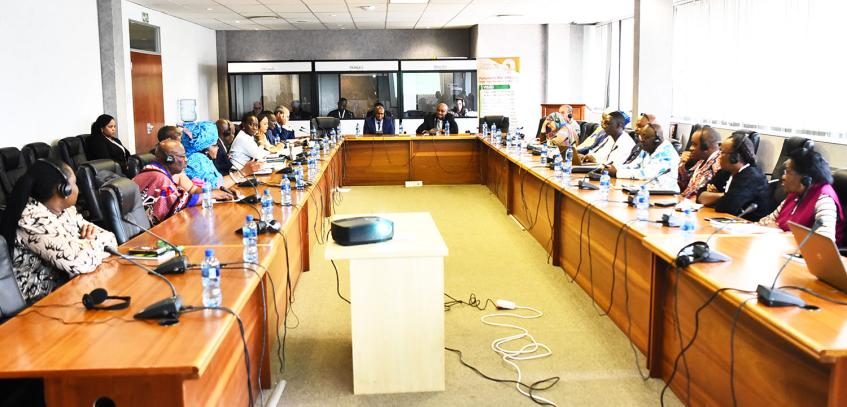Issues related to climate change, food security and national heritage were top of the agenda as members of the Pan-African Parliament (PAP), gathered for the first Ordinary Session of the sixth Parliament, met in their five regional caucuses to deliberate about proposals to amend the PAP’s Rules of Procedure.
After two days of deliberation, chairpersons of regional caucuses reported back to the Bureau ahead of the final presentation at the Plenary, where the recommendations will be further debated during the rest of the week.
The consultative meetings are conducted on the margins of the Ordinary Session held under the African Union theme for 2022, “Building resilience in nutrition on the African continent: Accelerate the human capital, social and economic development.”
The aim of the meetings was to discuss proposals to amend PAP’s Rules of Procedure, which haven’t been changed since 2011.
Climate change is a significant global issue and Africans will bear the brunt of its most severe impacts. According to the Hon. Dr Mathole Motshekga, a member of the Southern Africa Caucus, climate change, food security and arts, culture and heritage, are prominent UN and AU discussion points and should therefore feature more prominently in the PAP’s Committees.
One of the briefs for the five regional caucuses to amend PAP’s Rules of Procedure was to discuss the unbundling of the current 11 Committees and increase them to 15.
Chairperson of the southern Africa Caucus, the Hon. Pemmy Majodina, said that Climate Change should be included in the Committee for Mining, Energy and the Environment, thus becoming the Committee for Mining, Energy, Environment and Climate Change.
During the Caucus discussions, the different regions identified a broad range of rules and procedures that needed to be amended or replaced. Amongst others, definitions of terms, organs of PAP, the status and mandates of members, decorum’s, a common language and the structure of committees were discussed.
The East African Caucus chairman, Hon. Terrence Mondon, said that there should be a focus on several problematic issues rather than trying to consider all 94 rules. “Some of these issues are the process of nominating members, the procedure of electing new members, and the procedures of taking an oath, said Hon. Mondon.
According to Hon Alhagie Mbow, Chairperson of the Western Caucus, the absence of Members of Parliament during sessions should not go unpunished except in situations where there are valid reasons.
“We have noticed that some Members of parliament leave their home countries to attend sessions here in South Africa but do not turn up for the sessions. The Rules have to address this matter through having punitive measures and there should be reporting mechanisms to respective countries so that each member state knows what their representative is up to,” said Hon Mbow.
Unlike the other regional caucuses, the Central Caucus rejected the proposal to increase the number of committees to 15. The Central chairperson, Hon. Jaynet Kabila said that a lack of financial and human resources has resulted in the PAP not being able to manage the existing 11 committees. “Therefore, a change to Rule 22 will only be feasible if aligned with resources to ensure adequate delivery of the mandate,” said Hon. Kabila.
North Africa’s final document aligned with the Southern, West and East African presentations. The North is also of the opinion that committees should be increased to 15. Hon. Sen. Azzeddine Abdelmadjid said that the North African Caucus believes in the separation of powers and alignment and coherence between the different organs of the PAP.
The Plenary met again a 14h00 for further discussions.
-Ends-








